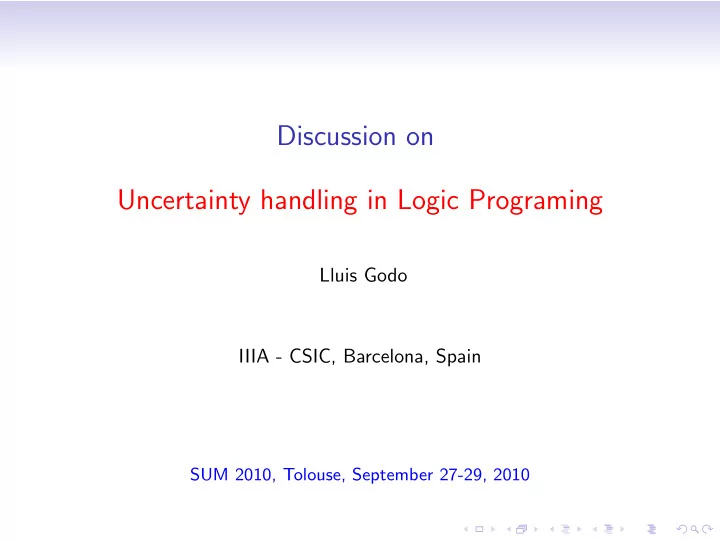

Discussion on Uncertainty handling in Logic Programing Lluis Godo IIIA - CSIC, Barcelona, Spain SUM 2010, Tolouse, September 27-29, 2010
Uncertainty / Fuzziness • uncertainty due to incomplete information or randomness on Boolean events truth-degrees ∈ { 0 , 1 } can be evaluated in a quantitative / qualitative way uncertainty measures on possible worlds uncertainty degrees ∈ [0 , 1] (usually) various models: probabilistic, possibilistic, belief functions, etc. • fuzziness partial satisfaction of gradual properties truth-degrees ∈ [0 , 1] (usually) full compositional laws for compound formulas
Logic Programming and Uncertainty A variety of logic programming languages handling different uncertainty and fuzzy models. One can classify them by: • Uncertainty / fuzzy model chosen: - probabilistic l.p. - possibilistic l.p. - belief l.p. - fuzzy (choices of aggregation operations) • Annotation-based / implication-based rules annotated rule: A : µ ← B 1 : µ 1 ∧ . . . ∧ B n : µ n (a interpretation makes true or false each basic annotated fact) weighted implication: ( A ← B 1 ∧ . . . ∧ B n , µ ) ( mv-valued interpretation of facts / rules )
Logic Programming and Uncertainty • definite programs: no negation involved fix point semantics (minimal models) • normal programs: negation by failure in the body of the rules links to non-monotonic reasoning: not A = A is not believed, ¬ A is consistent answer set semantics (stable models): minimal models of program reducts (Gelfond-Lifschitz reduction) • extended programs: negation by failure + classical negation answer set semantics: coherent stable models • disjunctive programs disjunctions in the head of rules qualitative form of uncertainty
Annotated logic programming languages • Generalized Annotated Programs GAP (Kifer-Subrahmanian, 89) • Probabilistic logic programs PLP (Ng-Subrahmanian, 92) Hybrid Probabilistic logic programs (Dekhtyar-Subrahmanian, 97) (Saad 06) • Action probabilistic programs (Khuller et al., 07), (Simari et al., SUM 2010) • Extended fuzzy logic programs (Saad, SUM 2009) Disjunctive Extended fuzzy logic programs (Saad, SUM 2010)
Conditional / Implication -based approaches • Conditional probability-based logic programs (Lukasiewicz, 2001) rules: ( A ← B , [ α, β ]) interpretations: Pr : 2 HB → [0 , 1] probability function Pr | = ( A ← B , α ) iff Pr ( A | B ) ∈ [ α, β ] inference: linear optimization techniques • Possibilistic logic programs (Dubios-Lang-Prade, 1991) rules: ( A ← B , α ) interpretations: N : 2 HB → [0 , 1] necessity function N | = ( A ← B , α ) iff N ( ¬ B ∨ A ) ≥ α Immediate Consequence operator based on weighted modus ponens: from ( A ← B , α ) and ( B , β ) derive ( A , min( α, β ))
Conditional / Implication -based approaches • Fuzzy / many-valued logic programs rules: ( A ← B , α ) I : At → [0 , 1] extends to rules by I ( A ← B ) = I ( A ) ⇒ I ( B ), where ⇒ is the residuum of a conjunctive aggregation operator (t-norm) ∗ I | = ( A ← B , α ) iff I ( A ) ⇒ I ( B ) ≥ α iff I ( B ) ≥ I ( A ) ∗ α Immediate Consequence operator based on fuzzy modus ponens: from ( A ← B , α ) and ( B , β ) derive ( A , α ∗ β )
Implication-based logic programming languages • Answer set semantics for possibilistic logic programs - (Nicol´ as et al., 2005, 2006) - (Bauters-Schockaert-De Cock-Vermeir, 2010) - (Nieves-Osorio, 2007) • Residuated Logic programs (Damasio-Pereira, 2001) truth-values domain: abstract residuated latiice • Normal logic programs over lattices and bilattices (Straccia, 2005) • Answer set semantics for fuzzy L.P.s - (Madrid-Ojeda, 2009) - (Janssen, Schockaert, Vermeir, De Cock, 2009)
Discussion • Annotated versus implication based approaches: - extendability? - expressiveness? - applicability? (Simari et al, SUM 2010) • Fuzzy logic programming languages: - weak link to well-established systems of formal fuzzy logic (e.g. � Lukasiewicz, G¨ odel, product logics) - answer set semantics: introducing non-monotonicity into fuzzy logics (fuzzy equilibrium logic - Schockaert et al.) • Integration of uncertainty and fuzziness handling - disjunctive Fuzzy LP (Saad, SUM 2010) • Scalability
Recommend
More recommend